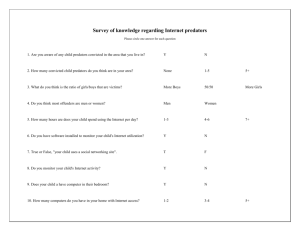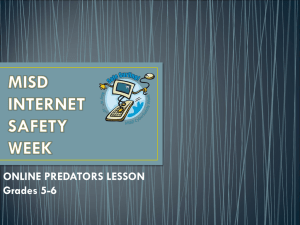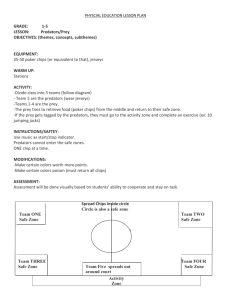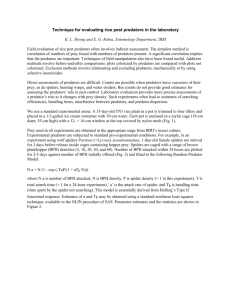5-3 notes.
advertisement
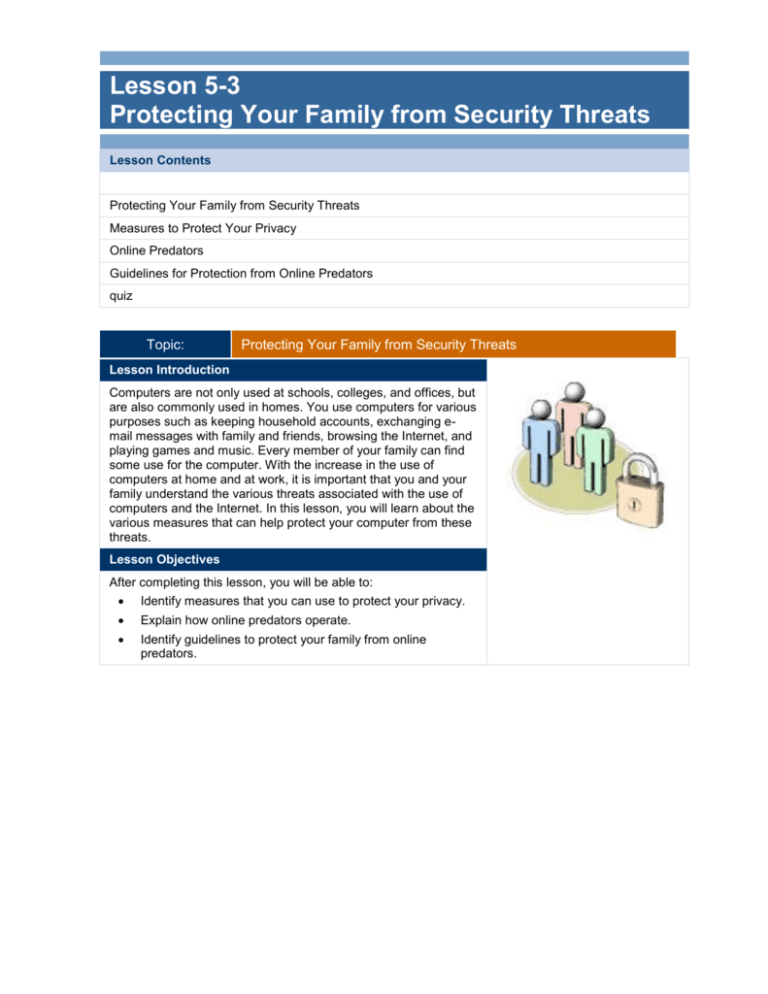
Lesson 5-3 Protecting Your Family from Security Threats Lesson Contents Protecting Your Family from Security Threats Measures to Protect Your Privacy Online Predators Guidelines for Protection from Online Predators quiz Topic: Protecting Your Family from Security Threats Lesson Introduction Computers are not only used at schools, colleges, and offices, but are also commonly used in homes. You use computers for various purposes such as keeping household accounts, exchanging email messages with family and friends, browsing the Internet, and playing games and music. Every member of your family can find some use for the computer. With the increase in the use of computers at home and at work, it is important that you and your family understand the various threats associated with the use of computers and the Internet. In this lesson, you will learn about the various measures that can help protect your computer from these threats. Lesson Objectives After completing this lesson, you will be able to: Identify measures that you can use to protect your privacy. Explain how online predators operate. Identify guidelines to protect your family from online predators. Topic: Measures to Protect Your Privacy With the growing popularity of computers and the Internet, there are multiple ways in which your privacy is compromised. You and your family members need to prevent these threats to privacy. The following table explains simple measures that you can take to safeguard yourself and your family members against invasion of privacy. Measure Description Shield your identity. Avoid sharing your personal information with anyone, unless you know the person. This is the golden rule of protecting privacy. While exchanging e-mail messages or chatting through IM, ensure that you do not reveal personal details about you or others known to you. Also, use strong passwords for access to your computer and e-mail connections. Make regular backups of your computer and important data. It is good practice to back up all types of the important and sensitive data on your computer. Important data might be documents, databases, or contact information. You can use various storage media such as CD or another hard disk to back up your data. If you regularly back up the data stored on your computer, you can recover the data in case the original data is damaged or deleted. Also, it is advisable to store the backup data in a secure place and restrict access to it by using passwords and encryption. Check current security level of your system regularly. Check the current security level of your computer regularly. Modern operating systems have built-in features that help you track the ability of your computer to safeguard against various threats to security and privacy. For example, Windows Action Center is a component in Windows 7, which helps you address system notifications and tasks like maintaining firewall settings, setting up schedules for software updates, and checking the validity of the antivirus software installed on your computer. Run virus scans daily. Each day when you access the Internet, there are chances that your computer is infected by viruses. Therefore, it is important that you run a virus scan on your computer everyday. You also need to keep the antivirus software on your computer up-to-date to protect your computer from new viruses. Use antispyware. Spyware programs can secretly enter your computer and transmit personal information about you and your family. Use antispyware software to keep a check on these malicious programs and keep the software up-to-date. Perform online transactions on secure Web sites with reputable vendors. When you perform an online transaction, you need to provide your personal information, such as your credit card details or bank account details, to the Web site. This information, if disclosed to others, can be misused for financial fraud. Therefore, it is important that you carry out online transactions only on secure Web sites. Course: Computer Security and Privacy 2 Report abuse to the ISP. Most reputable ISPs have a set of terms and conditions that does not allow its users to follow any unethical or illegal practices. You should report to the ISP whenever someone attempts to invade your online privacy by sending you spam or attempts to hack your computer. This allows the ISP to take action against such individuals. Filter e-mail messages from unknown/anonymous senders. You may receive a number of e-mail messages from individuals unknown to you. Such e-mail messages, referred to as spam or junk mail, can often be carriers of viruses or spyware. Hackers attempting to retrieve your personal information can also send you junk mail. Therefore, it is important to be careful while dealing with them. With e-mail software programs, you can create e-mail filters that help you block the junk mail. You must also ensure never to respond to junk mail because it can lead to an increase in unwanted messages and accidental sharing of personal information. Encrypt sensitive e-mail messages, if possible. Using encryption is a simple and effective way to ensure that your email communication remains confidential. Encryption is the process of encoding the e-mail message in such a manner that it appears unreadable to everyone except the intended reader. Most e-mail software, such as Windows Live Mail, provides this e-mail encryption feature. Course: Computer Security and Privacy 3 Topic: Online Predators The Internet is a popular medium of communication for people all over the world. You can get acquainted with someone while actually knowing very little about the identity and intentions of the individual. This aspect of the Internet communication can be misused by people to lure young individuals into inappropriate or dangerous relationships. The people who engage in such activities are known as online predators. Online predators generally target children, especially adolescents. It is during adolescence that children gradually move out of parental control and look for new relationships. Online predators attempt to establish a relationship of trust and intimacy with these children. Online predators can also target adults with the objective of financial exploitation. Online predators trap their victims by developing contact through chat rooms, instant messaging, email, or discussion boards. Among the various tools, chat rooms are the ones most commonly used by these predators. Online predators often assume a fake identity as a member of a specific chat room. For example, if the chat room belongs only to children, an online predator can easily assume the identity of a child in order to participate in that chat room. Topic: Guidelines for Protection from Online Predators You and your family members can become the target of online predators. These predators may try to establish contact with you or your family members to exploit you financially. The predators may also try to involve you and your family members in inappropriate relationships. The following table lists some guidelines that you can follow to protect yourself and your family from online predators. Guideline Description Know the signs of predator behavior. Online predators have some predictable behaviors, which can help you identify them easily. Online predators tend to converse in an overly familiar way very quickly. They often express a great deal of interest and affection toward their targets. You need to ensure that you and your family members can detect such behavior to avoid contact with potential online predators. Be cautious of offers from strangers online. Online predators usually lure their targets with gifts or other tempting offers. You should be cautious about such gifts or offers. Also, educate your family members to be suspicious about gifts offered over the Internet. Educate your family on online safety measures. Educate your family members on appropriate chat room behavior to avoid being targeted by online predators. Tell them to use nonsuggestive and neutral screen names. The screen names must not give away their actual name, age, gender, or contact information because this information can be misused. Some Web sites try to extract information under the pretext of feedback or surveys. Tell your family not to reveal any personal information to these Web sites without your permission. Also, ensure that your family does not give out any personal details, such as name, last name, address, and phone number, in social networking sites, blog posts or comments, and instant-messaging conversations. Course: Computer Security and Privacy 4 Your family members must not share their username and password with anyone, including friends. Guide children when they visit Web sites. As parents, restrict young children from visiting Web sites that are inappropriate for them, or those Web sites that bring them in contact with potential online predators. It is recommended that parents guide their young children when the children visit any Web site. As a parent, instruct your children to leave a Web site if it makes them uncomfortable or if the site contains any unpleasant content. Also, educate your children to leave a Web site that asks for excessive personal information. Know the sites visited by children. It is important for parents to regularly check the type of Web sites their children visit. You can track the previously visited Web sites by viewing the browser history or by using software that help you track the online activity of a computer. Block access to inappropriate Web sites. You can enable your browser’s Content Advisor feature to control the type of Web sites that your family members can visit while browsing the Internet. By using this feature, you can restrict children from visiting Web sites that contain adult content. You can also install certain software programs that help you block specific Web sites. Monitor chat activities. Specialized software can monitor chat activities and flag inappropriate information exchange on your computer. You can install these specialized software to track the chat activities of your children. Course: Computer Security and Privacy 5 Quiz Self Test For each pair of statements, indicate which is true by placing a mark in the column to the right. Statement 1 Answer Replying to junk mail CAN cause you to reveal personal information. Replying to junk mail CANNOT cause you to reveal personal information. 2 It is NOT POSSIBLE to monitor chat activity. It is POSSIBLE to monitor chat activity. 3 Children SHOULD NOT be allowed to visit Web sites alone. Children SHOULD be allowed to visit Web sites alone. 4 Online predators DO NOT GET overly familiar very quickly. Online predators GET overly familiar very quickly. 5 Encryption COMPRESSES the e-mail message so that it appears unreadable. Encryption ENCODES the e-mail message so that it appears unreadable. 6 Online predators LURE their targets with gifts. Online predators DO NOT LURE their targets with gifts. 7 ANTISPYWARE software helps keep a check on malicious programs. SPYWARE software helps keep a check on malicious programs. 8 Online predators DO NOT TARGET children. Online predators TARGET children. 9 The screen name used for chatting SHOULD be your real name. The screen name used for chatting SHOULD NOT be your real name. Course: Computer Security and Privacy 6 Keeping Your Computer Secure and Updated Lesson Contents Keeping Your Computer Secure and Updated Securing a Computer Configuring the Computer Security Settings Keeping the Computer Up-to-Date Self Test Topic: Keeping Your Computer Secure and Updated Lesson Introduction When you connect your computer to the Internet, your computer software and data are accessible to the rest of the world. Connecting to the Internet increases the threat to your computer from viruses, spyware, and hackers. However, you can minimize these security threats by configuring the security settings on your computer and keeping security-related software up-to-date. In this lesson, you will learn the importance of securing a computer and how to maximize the security of your computer by configuring the security settings on your operating system. The lesson also explains how to configure your computer to automatically update its security software. Lesson Objectives After completing this lesson, you will be able to: Explain the importance of securing a computer. Configure computer security settings using Windows Action Center. Identify the options for keeping your computer up-to-date. Course: Computer Security and Privacy 7 Topic: Securing a Computer Over the Internet, the biggest security threats to your computer come from hackers and viruses. Most of the time, these threats occur because the security settings on your computer are not set properly, or the security software is either missing or obsolete. In Windows 7, a new feature called Windows Action Center helps you keep your computer secure and healthy. The Action Center is a centralized location for notifications relating to security and maintenance issues such as virus protection, network firewall, and Windows Backup. You can also modify security settings depending on your requirements in the Action Center. You can perform the following actions by using the Action Center. Modify the firewall settings to help protect your computer from unauthorized access through the Internet. Configure your computer to automatically download and install updated security software to provide better protection from new viruses. Use the Internet security options to specify the privacy and security levels for the Web sites that you visit. Configure malware protection settings to detect and remove unwanted malicious software from your computer. Manage the status of important maintenance tools and tasks such as troubleshooting Windows and checking for updates. Lesson Takeaway The growing popularity of computers and the Internet has led to an invasion of your privacy. You and your family members can become the target of online predators. The following table describes some guidelines that you can follow to protect yourself and your family against such online predators. Measure Description Shield your identity. Ensure that you do not reveal personal details about you or others known to you, unless you know the person. Know the signs of predator behavior. Online predators often express a great deal of interest and affection toward their targets. You need to ensure that you and your family members can detect such behavior to avoid contact with potential online predators. Be cautious of offers from strangers online. Online predators usually lure their targets with gifts or other tempting offers. You should be cautious about such gifts or offers. Course: Computer Security and Privacy 8 Educate your family on online safety measures. Educate your family members on appropriate chat room behavior to avoid being targeted by online predators. Tell them to use nonsuggestive and neutral screen names. The screen names must not give away their actual name, age, gender, or contact information because this information can be misused. Monitor online activities of children. It is important for parents to regularly monitor the online activities of their children. You can also install software programs that help you block specific Web sites and flag inappropriate information exchange. Check current security level of your system regularly. Check the current security level of your computer regularly. Windows Action Center is a component in Windows 7, which helps you address system notifications and tasks like maintaining firewall settings, setting up schedules for software updates, and checking the validity of the antivirus software installed on your computer. Run virus scans daily. Each day when you access the Internet, there are chances that your computer is infected by viruses. Therefore, it is important that you run a virus scan on your computer everyday. Encrypt sensitive e-mail messages, if possible. Using encryption is a simple and effective way to ensure that your email communication remains confidential. Most e-mail software, such as Windows Live Mail, provides e-mail encryption feature. Course: Computer Security and Privacy 9

